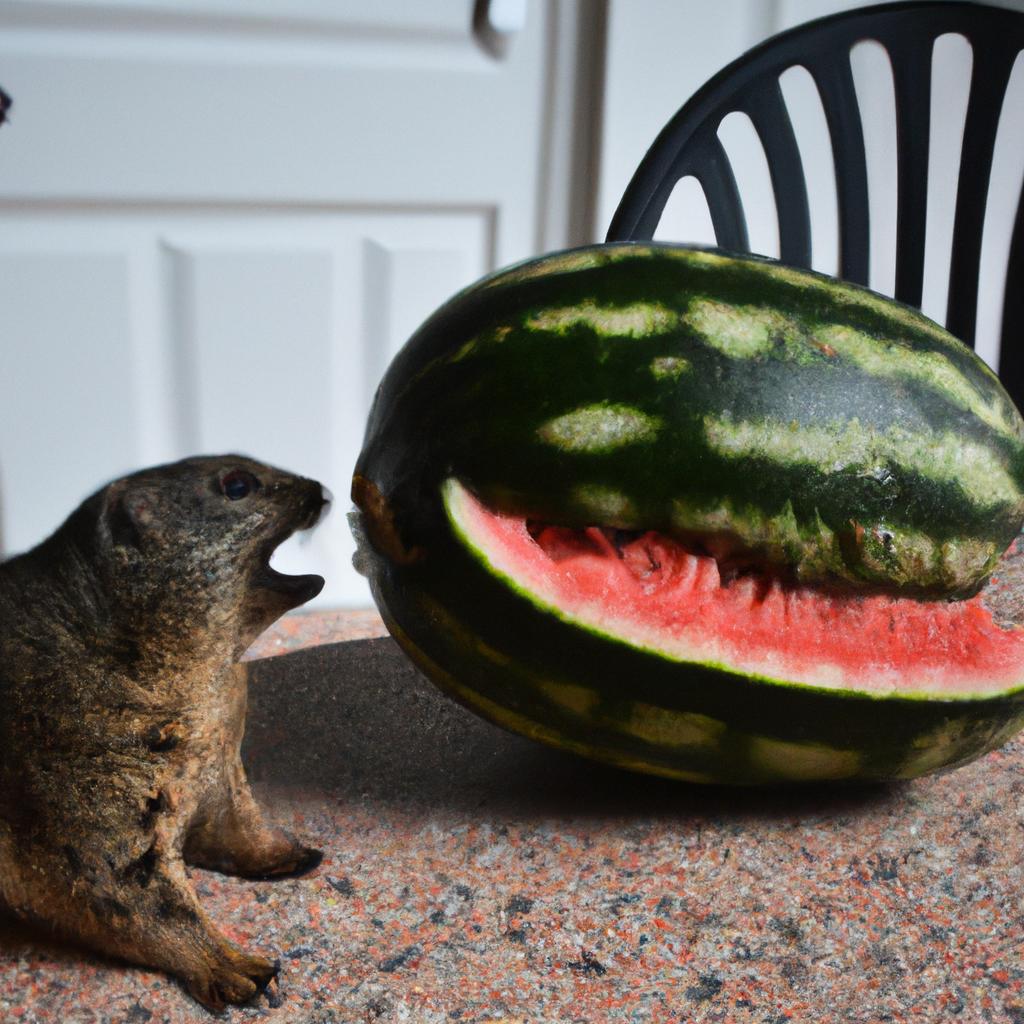As a passionate gardener, I have encountered several animals that have tried to eat my plants, fruits, and vegetables.
Yes, groundhogs do eat watermelon. They are primarily herbivores and enjoy a variety of fruits, vegetables, and plants. However, it is essential to remember that groundhogs can also cause damage to gardens and crops, so it’s important to take measures to protect your watermelon and other plants from these animals.
One animal that particularly caught my attention is the groundhog.
Groundhogs are herbivores that primarily feed on plants, fruits, and vegetables.
But the question that comes to mind is, do groundhogs eat watermelon?

Watermelon is a sweet fruit that contains high water content, which makes it a perfect snack for groundhogs.
However, groundhogs are not particularly fond of watermelon.
They prefer other fruits and vegetables such as carrots, lettuce, and apples over watermelon.
How and Why do Groundhogs Eat Watermelon
Groundhogs are known to feed during the day and night, but they are more active during the early morning and late afternoon. They have strong, sharp teeth that they use to bite into fruits and vegetables.
Groundhogs are also known to store food in their burrows for later consumption.
When groundhogs eat watermelon, they usually take small bites, and they do not eat the rind or the seeds. They prefer the juicy, red part of the fruit, which they consume in small quantities.
Groundhogs are not gluttonous animals, and they only eat what they need to survive.
Implications for Backyard Owners
As a backyard owner, it is important to be aware of the animals that can potentially eat your fruits and vegetables.
Groundhogs can be a nuisance, especially if they start to eat your plants and vegetables.
However, there are ways to deter them from your garden without harming them.
One way to deter groundhogs is by fencing your garden. A fence around your garden can prevent groundhogs from entering and eating your plants.
Another way is by using natural repellents such as garlic, hot peppers, and vinegar, which groundhogs dislike.
Other Animals that Might Eat Watermelon
Apart from groundhogs, there are other animals that might eat watermelon. Squirrels, raccoons, and deer are known to eat watermelon, especially if they are hungry.
Birds such as crows and blue jays might also eat watermelon, but they do not consume as much as groundhogs and other animals.
How To Keep Groundhogs Out Of Your Yard!
There are several things that can be done to prevent groundhogs from digging and eating stuff in your backyard. I will list some of the strategies below.
Also, see my recent post if you want a full list of my favorite methods to keep groundhogs and gophers away!
1. Using ultrasonic sound
Groundhogs, like other bigger mammals that may invade your garden, tend to have very good hearing. This means that loud or consistent noises will scare them away or at least shorten their visits.
Check out my full buying guide for these ingenious ultrasonic repeller devices here!
One of my favorite technologies to keep pests away from my backyard is these cool solar-powered ultrasonic sound emitters that you can buy right from Amazon! In my experience, they really work, and the solar panels on top save you the time and money of changing batteries all the time.
They will also work against other rodents like gophers, mice, and rats!
2. Sprinkling natural repellents
Groundhogs may be scared off by using natural scents such as coyote urine or predator scents.
They may also cause them to leave if there is a combination of sounds being played from a radio. The sounds include the sound of barking dogs and coyotes.
You can sprinkle dog hair, cayenne pepper or strong enteric oils and other natural repellents around the garden to keep the groundhogs away.
See my complete list of humane ways to keep groundhogs away from your yard for more tips and tricks!
3. Fencing around the garden
You can also fence around your garden to keep groundhogs from entering the garden. It should be at least 3 feet deep and have a double row of fencing.
Groundhogs are good diggers so it has to go underground or they may find a way into the garden even with the fences in place!
4. Using live traps
You can use a live trap to capture groundhogs and move them to another area. Live trapping is currently the most humane way of groundhog control. Once you have removed all groundhogs from an area, it is important to ensure that they do not come back by using fencing or other barriers to block access.
You can also just buy a live trap, as the sturdy metal ones shown here:
To lure the groundhogs in, you can use one of the numerous favorite foods of groundhogs or an optimized extra attractive formula like this one to make the catch even quicker!
5. Using natural pesticides
There are pesticides or rodent toxins that can be used to kill groundhogs on your property. These may also affect other animals in the area so it is important to ensure that they are only sprayed on the targeted plants.
I do not recommend these, as I prefer more humane ways as described here. Also, anything that kills an animal will also harm humans to some degree, so go for a repellant rather than a toxin if you go the chemical route!
6. Using Scarecrows
You can use a scarecrow in your garden to keep groundhogs away. Groundhogs are afraid of novelty so time-sensitive or motion-activated scarecrows may also be effective in keeping them out of the garden.
7. Using Lights
Groundhogs are not strictly nocturnal animals but they are most active at low light so they do avoid areas with bright lights.
Motion-activated lights, sounds, and sprinklers may help prevent groundhogs from entering your yard.
Any blinking light will confuse and scare away groundhogs from your yard, especially if they are motion activated and sudden!
8. Motion-activated sprinklers
Like most animals, groundhogs hate surprises, and they will run away if suddenly sprayed with water. I like this solution because it is humane, simple, effective, and does not require much time to set up.
The Havahart 5277 is a motion-activated sprinkler that is activated by the movement of animals up to 25 feet away and sprays them with a harmless water jet, frightening them off and keeping them at bay.
The included metal stake makes it easy to install in your garden, and the sprinkler can be rotated 180 degrees for maximum coverage.
In conclusion, groundhogs do eat watermelon, but they are not particularly fond of it. As a backyard owner, it is important to be aware of the animals that can potentially eat your plants and vegetables and take necessary precautions to protect them.
Natural repellents and fencing can go a long way in keeping groundhogs away from your garden.
















